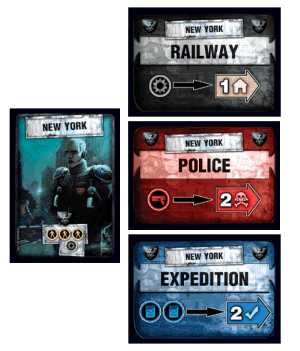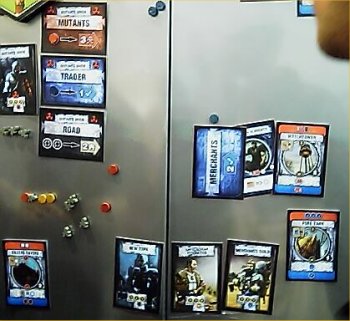

![[IMAGE]](../bilder/51state1.jpg) |
Author: Publisher: No. of Players: Awards: |
![[IMAGE]](../technik/box/rot/rot-6.gif) ![[IMAGE]](../technik/box/gelb/gelb-9.gif) ![[IMAGE]](../technik/box/grun/grun-5.gif) ![[IMAGE]](../technik/box/pink/pink-9.gif) ![[IMAGE]](../technik/box/blau/blau-10.gif) |
|
 Every faction starts with its home base card which will provide its player with some workers and a resource which he may use each turn, and in addition each of the faction also receives a fixed set of three permanent "Contact"-cards which come in quite handy since they may be used for adding new cards to a player's sphere of influence. Everything else needs to be acquired during the course of the game, and here Ignacy has found quite an interesting set of rules when it comes to the addition and use of new locations. Situated in the wastelands they players may find different locations which may be useful for their further development, and these locations are represented through the majority of cards in the deck of playing cards. These locations may be found at three different levels of remoteness, with the most useful cards been furthest away from the players' realms. Thus, the players will need to generate means to add even the more remote cards to their sphere of influence, and here the "Contact"-cards come into play. The "Contact" cards allow the players to spend resources to go on expeditions for a new location card from their hand, but every player has the option to send an expedition either for conquering the new location, for establishing economical cooperation or for a permanent incorporation of the new card to the player's realm. Depending on the chosen faction, the players have different levels of effectiveness in each of the three expedition-categories, so that - for example - the Mutants' Union has the possibility to conquer locations at all three levels of remoteness, whereas the Merchant's Guild has its strength in establishing cooperation agreements. New York is weaker in both of these categories since it has contact cards with a higher consumption of resources and a lower maximum range, but due to its rebuilt infrastructure New York is well stocked with resources needed to make short range incorporations, an option which is not available to the aforementioned factions at the beginning due to missing resources. The Appalachian Federation is the only other faction which has resources to make incorporations right from the beginning, and the higher price which the AppFed needs to pay for incorporating is made up by the fact that their home base produces building materials, a resource which will be in high demand later in the game. Conquest, cooperation and incorporation all have its own benefits, and it strongly depends on the strategy a player follows which way he deems to be most fitting when it comes to the playing of a new location card. A conquered location will be destroyed, but the player making the conquest will receive a nice yield of spoils like resources or victory points which will make a conquest worthy. Cooperation on the other hand will create a permanent income each turn, but of course this income will be lower than the one-time effect which could be created through conquest. Incorporation means that the location will be permanently added to the player's sphere of influence, counting as one victory point and giving the player access to the locations inherent resources, production capacities and special abilities. While this short comparison may leave the impression that incorporation always should be a player's first choice, playtesting quickly revealed that incorporation consumes most time and resources so that - in order to keep up with the other factions - the players are forced to focus on the incorporation of some chosen cards, while using other cards for making agreements or conquests, thus securing either one-time spoils or a small permanent income. Of course, much depends here on a player's faction, and so the Mutant's Union certainly will go more often for conquest than the New Yorkers. The players receive new cards for their hand at the beginning of each round in a phase which is called "Lookout". New cards from the deck are revealed during this phase, and the players are allowed to chose new cards from the revealed set of cards following the rotating player order. Thus, players do not need to rely totally on their luck when it comes to getting new, matching cards, but instead they have some moderate means to chose the most fitting card out of a certain offer. Next phase is "Production", and now the players' bases, their cooperation agreements and some of their locations will produce new resources (scrap, fuel, weapons, building materials). Other assets which also can be obtained during this phase are some workers or even victory points, and all resources and workers now can be used in the following "Action" phase. The "Action" phase is the opportunity for the players to fill their strategies with life, since they now can use their resources to activate their "Contact", allowing the conquest, cooperation or incorporation of/with new locations. To extend a player range for these expedition actions, some locations allow the production of special contact tokens which can be used for a one time increase of the existing "Contact" cards, and furthermore the deck of playing cards also contains some one-time contact cards which may be used for sending out an expedition. However, this phase also sees the use of the players' workers, and if the players have added some worker-dependant locations to their spheres of influence they now may send out the workers in order to operate the production capacities and special abilities of these locations as it seems most fitting. There even exist some locations which may be used by the opposing players, but the owner of such a location will receive a "user fee", and so he will be allowed to use all the foreign workers sent to his location during this turn as well. A special kind of action which also should be mentioned here is the redevelopment-action which can be preformed through the use of building materials. The Appalachian Federation usually will use this action most often due to its permanent access to building materials, and the action can be used to replace a location by a location of the same type, regardless of the remoteness range of the new card and the replaced card. Thus, the redevelopment action actually may be used to circumvent the need for a long-range expedition, but once again a player will need resources and matching cards to make the exchange. Apart from the locations and the one-time contacts the card deck also contains a third category of cards which may play a role during this phase - the "Leaders". A leader can be played for free, and he may bring some resources with him which might be used for other kinds of actions. In addition, seven of the eight available "Leader"-cards will create victory points for their owner if he plays a special kind of cards, and so - once again depending on a player's strategy - a matching leader may maximize the yield of victory points. Leaders even can be exchanged (through the use of a weapons resource), and so even a change of strategy can be performed since all victory points accumulated by a deceased leader can be kept. To keep this phase structured and filled with tension, the players act step by step, with each player performing one action an then passing play to the next player in turn order. This way the players keep performing actions until they decide not to act anymore, and so the phase will end when the last player has decided to stop his actions. However, while the stopping of actions means that the other players may not use that player's locations anymore, it also ends that player's action phase for good. There is no returning to the active status - regardless of the other player's actions. Before the round ends with the removal of most left-over assets (only a few resources may be stockpiled if a player possesses a special location or on leader cards) the players will count their victory points. It is important to not here that points are not scored on a turn-by-turn base, but instead each round the players add up their current total of points (one point for each location, one point for a leader, two points for a redeveloped location or a removed leader, plus X points generated through locations, spoils, leaders or agreements). The game will end if at least one player has reached a total of 30 victory points, and after that round the player with most points will be declared to be the winner. WOW! While it is true that I hold a certain liking for apocalyptic scenarios ever since the release of the Commodore 64 classic RPG "Wasteland", I have rarely seen a boardgame which was able to convince with this setting. However, 51st State is not only one of those rare games which meets the demands of such a scenario on the points of setting and graphic design, but instead 51st State also offers a very sophisticated base of building-and-development rules which can be rarely found within the scope of a mere cardgame. Of course, some tokens are needed to represent workers, victory points and resources, but otherwise the game is fully operational just through the use of the playing cards. To differentiate between the three kinds of expeditions, Ignacy has cleverly divided the cards into three different parts, including a small upper and lower part which are used when such a location is conquered or a cooperation agreement is sealed. In this case the card is placed under a player's base, only revealing the small part showing the result of the expedition, and so no mix-up can be made between these cards and incorporated locations. Only incorporated locations are fully revealed and added to a player's sphere of influence, and here the biggest, middle-part of the cards will be used during the action phase, ignoring the upper and lower parts of the card which were used for conquest and cooperation.  A bit resource management, a bit of worker placement, and even a bit of the multiple card use we know from games like Race for the Galaxy or San Juan can be found in this game. However, despite these superficial similiarities 51st State still is unlike any other game I have seen before. The ways to go for victory are manifold, and even some interaction possibilities are included, either indirectly through the one-action-rotation-principle, or even directly through the use of special abilities associated with some locations. Being a big fan of Race for the Galaxy including all three expansions, 51st State is a must have for me due to its comparable degree of complexity and the ever-changing challenge found with each game. And to make it even better for all of you fearing for your national release: 51st State is language independent! Only the card names are given, everything else is dealt with through the use of symbols! | ||
|
| ||

|
|

|
|
| ||
|
Impressum / Contact Info / Disclaimer Kulkmann@aol.com
Copyright © 2010 Frank Schulte-Kulkmann, Essen, Germany | ||